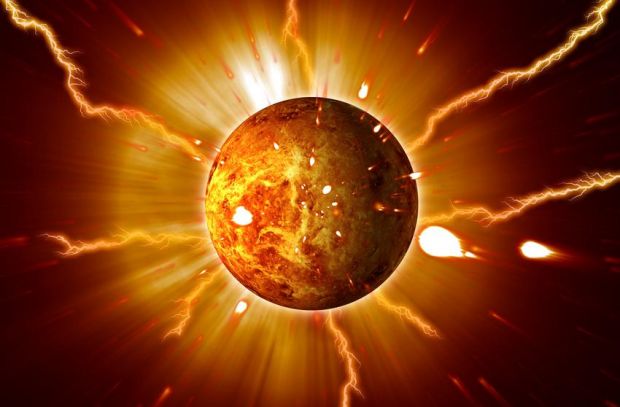Magnetic storms are a phenomenon that can affect a person's well-being, causing headaches, sleep problems, and even sudden mood swings. According to astronomers, an average magnetic field disturbance is expected on April 1. WomanEL tells how a magnetic storm can affect the health of weather-sensitive people on the first day of April.
Content How magnetic storms affect the bodyMagnetic storm and sleep: why it's so hard to fall asleepMood under threat: where does irritability come fromHow to alleviate the effects of a magnetic storm
How magnetic storms affect the body
Scientists explain that a magnetic storm is a disturbance in the Earth's magnetic field caused by solar flares. On such days, many people feel tired, irritable, sleepy, or, conversely, insomnia. Doctors note that hypertensive patients, people with cardiovascular diseases, and those who suffer from migraines are most affected.
 How the magnetic storm on April 1 can affect blood pressure, sleep and mood. Source: pinterest.com
How the magnetic storm on April 1 can affect blood pressure, sleep and mood. Source: pinterest.com
During magnetic storms, blood viscosity increases, which can cause blood pressure spikes, headaches, and even the risk of thrombosis, explains cardiologist Olga Romanenko.
That is why on such days, doctors recommend paying more attention to your well-being and not overloading your body.
Magnetic storm and sleep: why it's so hard to fall asleep
Often, on days of magnetic storms, people complain of sleep problems. Some people can't fall asleep, others wake up in the middle of the night, and in the morning they feel exhausted.
Due to magnetic storms, the body is in a state of stress, producing more cortisol, a hormone that suppresses melatonin and disrupts the natural rhythm of sleep, explains neurologist Iryna Savchuk.
To alleviate the condition, doctors advise following a regimen, ventilating the room before bedtime, limiting the use of gadgets in the evening, and drinking herbal teas with lemon balm or chamomile.
Mood under threat: where does irritability come from
Many people notice that during magnetic storms, their mood can change literally every hour. A person feels depressed, nervous, or even aggressive. Magnetic storms affect brain function and serotonin levels, which can cause emotional fluctuations and even apathy.
To avoid sudden mood swings, experts advise taking more walks outdoors, exercising, and not overloading yourself with unnecessary information. Breathing exercises and relaxation techniques will also be helpful.
How to ease the impact of a magnetic storm
Magnetic storms cannot be avoided, but their impact on the body can be reduced. It is important to drink enough water, not to abuse coffee, avoid stressful situations and follow the daily regimen. If you are a weather-sensitive person, listen to your body and respond to the signals it gives.
Changes in nature are felt by everyone, but a healthy lifestyle will help minimize their impact and maintain good health even on adverse days.
Previously, we talked about magnetic storms on March 31: how dangerous they are and how to protect your health.
